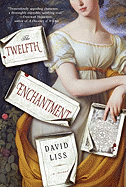
It's a testament to David Liss's confidence that, deep into The Twelfth Enchantment, he can set up a meeting between Lord Byron and William Blake and then have them barely acknowledge each other's presence, let alone talk about poetry. It doesn't matter: by then, you're totally involved in the story of Lucy Derrick, an orphaned young woman with a precarious reputation who must track down the pages of an alchemical manuscript that will play a critical role in the fight between the Luddites and the Rosicrucians over England's industrial revolution.
Laid out like that, it may sound a bit silly, but from the opening pages, Liss carefully builds up his scenario; as the convincing Regency setting begins to accumulate more and more supernatural features, you may share Lucy's skepticism, but like her you'll become gradually convinced of its plausibility. (No surprise there; Liss has built a loyal fan base on the verisimilitude of historical thrillers like The Whiskey Rebels and A Conspiracy of Paper.) Lucy is guided out of her initial position of helplessness with training in the magical arts from Mary Crawford--yes, Austen fans, that Mary Crawford--but the tight restrictions for a woman in 1800s British society always loom over her adventures. Deftly blending historical facts, folklore and literary allusions, Liss creates a story that refuses neat genre categorization: The Tweltfh Enchantment works equally well as Regency romance and occult thriller. Think The Da Vinci Code, set 200 years in the past... and, truth be told, a rather more elegant prose style. --Ron Hogan, founder of Beatrice.com

